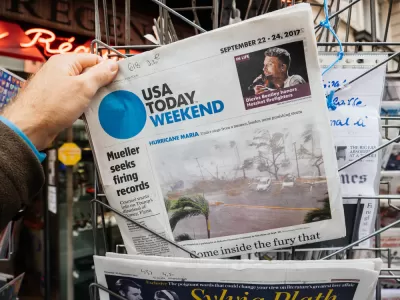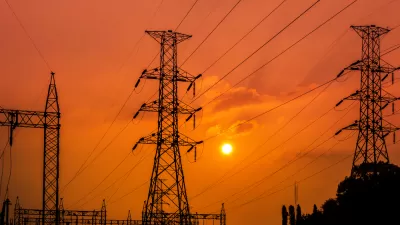Hurricane Maria left the flooded island of 3.4 million American citizens without power, communications, and running water, which may take months before they are restored. An exodus to Florida, which had begun before Maria hit, will likely accelerate.

The devastation caused by Hurricane Maria, which made landfall on September 20, has been described as "apocalyptic," and despite claims by the Trump Administration that "[t]he federal response has been anything but slow," the island's residents, who are American citizens as the island is an unincorporated U.S. territory, are hurting badly.
All of the electricity on the island now comes from generators. The problem lies not with the power plants, but from the fact that "roughly 80 percent of transmission lines which take power from the plants to distribution centers, are down," reports Rachel Becker for The Verge.
The mayor of San Juan has said she expected it could take four to six months for the lights to turn back on — but the Puerto Rico Electric Power Authority's chief executive told the New York Times he expected three to four months, at most.
"Even before it was hit by Irma [on Sept. 20] and now Maria, the Puerto Rico Electric Power Authority said it needed more than $4 billion to overhaul its outdated power plants and reduce its heavy reliance on imported oil," reported Steven Mufson for The Washington Post. "The company filed, in effect, for bankruptcy July 2."
Similarly, the island had already suffering from a host of economic and financial problems well before the two hurricanes hit, reports for The Washington Post, which resulted in an exodus of "about 80,000 Puerto Rico residents" moving to the mainland United States last year. "Most of them relocated to Florida."
[T]he arrival of thousands of island transplants has transformed cities such as Orlando and Kissimmee and is changing local and national politics. Puerto Ricans are U.S. citizens who can participate in presidential primaries but cannot vote for president while living on the island.
Another area likely to see Puerto Rican migration in the "thousands" will be New York City, said Mayor Bill de Blasio, report Yoav Gonen and Danika Fears for The New York Post.
Without immediate help from the US government to rebuild the island, “there will be a mass exodus to the United States,’’ said Puerto Rico Gov. Ricardo Rosselló.
"Rep. Nydia M. Velázquez (D-N.Y.), whose Brooklyn-area district has a significant Puerto Rican constituency...warned that if legislation addressing the economic problems isn’t coupled with federal hurricane relief, 'we’re going to have an unprecedented number of people who will continue to leave the island,'" adds O'Keefe.
FULL STORY: Hurricanes may compel even more Puerto Rico residents to flee to the mainland, officials warn

Planetizen Federal Action Tracker
A weekly monitor of how Trump’s orders and actions are impacting planners and planning in America.

Chicago’s Ghost Rails
Just beneath the surface of the modern city lie the remnants of its expansive early 20th-century streetcar system.

San Antonio and Austin are Fusing Into one Massive Megaregion
The region spanning the two central Texas cities is growing fast, posing challenges for local infrastructure and water supplies.

Since Zion's Shuttles Went Electric “The Smog is Gone”
Visitors to Zion National Park can enjoy the canyon via the nation’s first fully electric park shuttle system.

Trump Distributing DOT Safety Funds at 1/10 Rate of Biden
Funds for Safe Streets and other transportation safety and equity programs are being held up by administrative reviews and conflicts with the Trump administration’s priorities.

German Cities Subsidize Taxis for Women Amid Wave of Violence
Free or low-cost taxi rides can help women navigate cities more safely, but critics say the programs don't address the root causes of violence against women.
Urban Design for Planners 1: Software Tools
This six-course series explores essential urban design concepts using open source software and equips planners with the tools they need to participate fully in the urban design process.
Planning for Universal Design
Learn the tools for implementing Universal Design in planning regulations.
planning NEXT
Appalachian Highlands Housing Partners
Mpact (founded as Rail~Volution)
City of Camden Redevelopment Agency
City of Astoria
City of Portland
City of Laramie




























